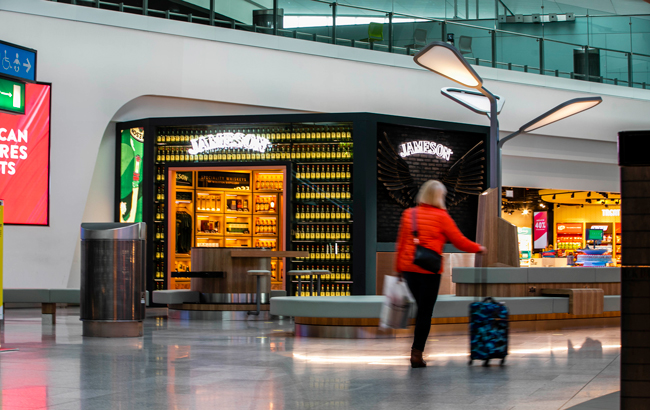This website uses cookies so that we can provide you with the best user experience possible. Cookie information is stored in your browser and performs functions such as recognising you when you return to our website and helping our team to understand which sections of the website you find most interesting and useful.
Pernod Ricard: travellers spending more in GTR
By Melita KielyTravellers are willing to spend more money in global travel retail (GTR), creating a “clear premiumisation trend” for spirits in the channel, Pernod Ricard GTR has witnessed.

Liya Zhang, marketing vice-president for Pernod Ricard GTR and a 20-year veteran of the firm, said premiumisation is an obvious trend in the sector as travel rebounds after the Covid-19 pandemic.
“Covid shifted the value of people; we want to treat ourselves better, treat our family better. So there is a clear premiumisation trend,” Zhang noted.
Digitalisation is another important trend in the channel, as noted by Zhang, and is continuing to prove important as the GTR channel rebounds.
“The crisis has forced everyone to accelerate this digitalisation journey,” Zhang said, who added that “30% of travellers said they would consider using click and collect” while travelling.
“Of course, when you’re locked up, everyone has picked up the habit of online: online booking, online planning for their travels, so this digitalisation is an opportunity [for Pernod Ricard].”
Furthermore, sustainability will play a key role in the successful rebound of GTR, Zhang assured.
In 2019, Pernod Ricard released its ‘Good Times from a Good Place’ 2030 sustainability and responsibility roadmap, with eight key commitments across the business from grain to glass.
There are four pillars that uphold the company’s targets: responsible hosting, valuing people, circular making, and nurturing terroir. For GTR, the biggest contribution comes from circular making.
Pre-pandemic, Pernod Ricard launched around 1,000 retail projects in GTR annually, which contributed towards its carbon footprint.
In 2021, the company worked on developing a life-cycle analysis tool – a first for the wine and spirits industry – to assess the sustainability performance of each retail project. Pernod Ricard is working to reduce its carbon dioxide emissions by 50% by 2030.
“Everyone realised that sustainability really impacts everyone’s life, life today and in the future, including Pernod Ricard,” Zhang said. “We want to be the leading player at the industry for wider impact on this subject.”

Supply chain challenges
One of the biggest challenges for Pernod Ricard in travel retail is the ongoing supply chain struggle.
Zhang explained this challenge starts from production to shipping costs and shipping availability.
“It’s a short-term bottleneck, but fortunately we have planned a lot with our customers to do the best of what we can because we know it’s important for the recovery,” Zhang explained. Sustainability will be part of the “transformation” as issues are ironed out.
“I will add two more key areas which we are working on. First, traveller-centric consumer engagement,” Zhang said. “When we think about travel retail consumer engagement, we only think about terminals, airports, promotion campaigns; but today is part of an omni-channel, offline, online – seamless engagement must be ongoing.
“And second, we know that this is how to fulfil the needs of consumers. Consumers have become more demanding on retail experience, in regards to retail excellence, from the concept to design, and all experiences leading to purchase. It’s a challenge.”
Pernod Ricard GTR opened its first Martell boutique at CDFG Haitang Bay in Hainan in 2021, followed by its first duty free boutique with Shenzhen Duty Free in the Mission Hills shopping complex, in Hainan. The boutique is a cross-category space, selling both whisky and Cognac.
Traveller-centric strategy

Going forward, Pernod Ricard GTR’s brand focus will vary across the channel, dependent on traveller demand and interest.
“In GTR, we are a global market,” explained Zhang. “So we have a special brand strategy [due to the] matrix of nationalities of travellers and destinations.”
For example, while Ballantine’s is an important brand, it’s particularly important for Korean travellers – “our primary target [for the brand]”, according to Zhang.
“But I’d say Ballantine’s isn’t as important for other markets,” Zhang added. “Jameson and Absolut [are] really about global footprint, Martell is maybe [aimed] towards Chinese travellers. Pricey whisky like Royal Salute used to be [targeted] towards Chinese travellers, but today we can see the growth is everywhere – it’s in America, the Middle East.”
The company’s strategy going forward will be “traveller-centric” rather than “market-centric”, Zhang added.
“For example, Chinese travellers are not obviously in Shanghai airport or Hong Kong airport, today they go to Hainan because it’s difficult to travel overseas,” Zhang said. “For example, we know that usually, Paris is an important destination for Chinese travellers, but that’s not the situation today. So today, if we want to target Chinese [travellers], Hainan is the location. It’s all dynamic.”

